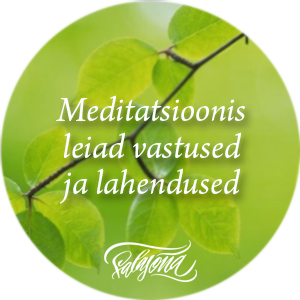Kadi Kütt
This contemplation is dedicated to all those who believe that they should be something completely different than they are. They should be bolder to take risks, be more expressive in expressing their opinion, be more active in showing initiative, be wittier in social conversations and reveal themselves more boldly on social media. It is for people who are sure that they do not fit into this world as they are: quiet, thoughtful, careful, introverted… I know these dissatisfied people well because they often sit opposite me in a therapy session and I have long been one of them.
Openness and activity are honoured.
Western culture is oriented in results and success; the keywords are competition, engagement and attractiveness. We live in a ‘set yourself high goals and achieve them!’ society. Time and time again, people talk about the need to get out of their comfort zone and face the challenges of life. Let the one who doesn’t like to communicate, who is afraid of the crowds give a speech, let all the geeky loners learn to establish themselves in communication training. Pull yourself together! Change yourself!
‘I’m too modest, I should speak up more in meetings”, “I should be able to react more quickly and answer immediately!”, “I can’t make people laugh the way my friends can.”– these are only a few objections my clients make of themselves.
To be successful at work, you need to be open and active. Recruitment advertisements show that the most needed is a person who is an open communicator, an active initiator and a good negotiator. At the same time, open communicators and proactive people are wanted for positions that primarily benefit from the accuracy, correctness and noticing details (e.g. accountant). It sets preconditions for rapid burnout because the expectations of the organisation do not coincide with the actual nature of the work and, in all likelihood, with the employee’s innate nature.
We are pieced together differently.
Extraversion and introversion are important concepts in personality psychology that became famous thanks to Carl Gustav Jung, the founder of analytical psychology. Jung distinguished between two different attitudes towards the world – he called personalities whose reactions are more external and who are more intense and excited about the world, extroverts, while those who do not show their reactions very openly but prefer to hide them, showing more interest in their inner world, he called introverts (http://junganalyys.ee/). We are born with a tendency to extraversion or introversion, but the so-called pure types are rare. Each of us has traits from both ends of the scale; most of the time, we can adjust and orient ourselves outwards or inwards according to the situation.
In the 1990s, scientists made it clear that in the case of introversion-extroversion, we can not only talk about psychology, but it is also a field of biology, i.e. that different physiological features of the brain drive our personalities and actions. Experiments have shown that electrical activity in the frontal lobe of the brain – the part of the brain that deals with internal processes such as learning, decision-making, memory and problem-solving – is different in introverts and extroverts. In 1999, American physician Debra Johnson demonstrated that introversion is associated with increased blood flow to a given part of the brain. Blood in the brains of introverts, or quiet people as Johnson calls them, flows a different path and stimuli travel along nerve fibres deeper into the brains than in extroverts. That’s why it takes longer for introverts to think, to weigh different options, to understand things fully and to decide. If you are a quiet person, do not try to answer your colleagues’ quick questions on the go or shoot solutions from the hip at all cost! Know that all the good answers-solutions are inside you, they are just profound and it will take time to dig into the repository. I remember the tension I had at the board meeting when I had to give my opinion on the projects from which I had only received the first pieces of information. How can I have an opinion if I don’t have all the information? And why do we even always have an opinion? It is challenging for an introvert to formulate an answer if they have not yet fully understood the question, or if it has not even been formulated yet.
The innate level of neurotransmitters in the brain also varies from person to person. For example, the higher amount of dopamine typical for extroverts affects openness, curiosity, cheerfulness, and risk-taking. As a result, these people are bolder to take risks, whether these are challenges, conflicts, or they need to step in front of a large audience. Introverts’ brains, on the other hand, produce more acetylcholine, which the body uses to concentrate, keep calm, relax and maintain the status quo. Thus, it is much easier for introverts to adhere to a routine and take breaks between being active and in the interests of their internal balance, it is also important.
The above is also one of the reasons why active communication training and group work with video feedback are not suitable learning methods for everyone. For a quiet person, intense communication, external stimuli, endless sharing circles, or even background music can hinder learning. They need more time and personal space to digest information; they want to delve deeper and focus on the topic. You can also learn something new by reading books in peace and quiet or by discussing things with a smart person behind a cup of tea. I use these options often.
When extroverts receive energy from active outward behaviour, the source of energy for introverts is peace, quiet, and solitude. As I am self-employed, all marketing activities are also on my own shoulders. Every business owner knows that in order to stay in the picture, they need to make themselves visible to potential clients or customers. The more personal the story, the more effective it is, isn’t it? The need to be on social media makes me tired as an introvert. It seems exaggerated and intrusive. Life and people are very exciting for me too (otherwise you wouldn’t be able to work as a psychotherapist and a trainer), but much more than sharing my thoughts, impressions and achievements on social media, I like to think by myself, take notes and exchange thoughts with a good friend. Instead of criticising other people who are bolder and more open, I have to make my own ‘quiet’ means of self-expression to make money.
A similar story is with feedback. For extroverted business executives, client opinions and suggestions are very important. They put together reference groups and call clients to ask for their opinions and preferences and count Facebook likes. Oh, for the introvert, it’s all uncomfortable and tedious!
In harmony with your own nature.
Sometime in the 1990s, I read a character reference given to me by my boss, a psychologist: “As an introvert, Kadi is like a valuable purebred horse – ready to put in a lot of effort, but then she needs to disengage and rest; otherwise she will burn out.” Why didn’t I take it seriously enough at that time? I’ve spent most of my life adapting to other people’s expectations and pushing the limits – obviously, I worked too much, fought someone else’s battles, participated in brainstormings making helpless attempts to generate big ideas, performing ‘here and now’ tasks that did not fit my prudent nature. It has required beating myself up and disowning myself and I have considered myself to be timid, incompetent and total broke because of not feeling well. Years ago I planned skydiving (which I, unfortunately, didn’t get to) and a rafting trip (which almost cost me my life) to train myself to be bolder. Now I take things easier. I am the way I am. Different.
Linus Jonkman’s ‘Introvert: The friendly takeover’, Jenn Granneman’s ‘The secret lives of introverts’; Susan Cain’s ‘Quiet: the power of introverts in a world that can’t stop talking’ and Sylvia Loehken’s ‘Quiet impact: how to be a successful introvert’ – these are good books and required reading to anyone who feels compelled to cure themselves to be ‘normal’, i.e. suitable for an extroverted society. The authors encourage introverts to live in harmony with their own nature, not to fight it. Worth to read!
Anyway, these books have helped me a lot. It is comforting to know that not everyone needs to like travelling, that enjoying a fascinating book in an armchair instead of discovering foreign countries does not make a person an uncultured swine. The fact that I don’t feel comfortable in the overwhelming crowd eating french fries at the song festival does not make me a worse Estonian. If I feel uncomfortable making small-talks, skip impromptu speeches at anniversary dinners, or refrain from sharing details of my daily life on Facebook, it doesn’t mean I’m shy or struggling with social phobia. I’m just an introvert (who has to cope in an extremely extroverted world).
I learn to notice and be gentle with myself; I constantly remind myself that it is pretty nice to be who I am and not to let someone else’s values and expectations influence me too much. Learn to ask for space and take time for yourself. At the same time, I try to refrain from judging others who I used to find too energetic, intrusive, hip-shooter and over-achiever.
Also, as a therapist, one of my tasks is to remind people that they already are enough and good, that they shouldn’t expect something else from themselves all the time. In addition to setting goals, facing challenges and getting out of your comfort zone, you must also allow yourself to be you, to look at your peculiarities with loving eyes. Otherwise, we spend unnecessarily much energy and talent and we will end up being tired and unhappy. We can be successful and productive in this extroverted society only if we live in harmony with our nature, feel secure, and take care of ourselves.













0 Comments